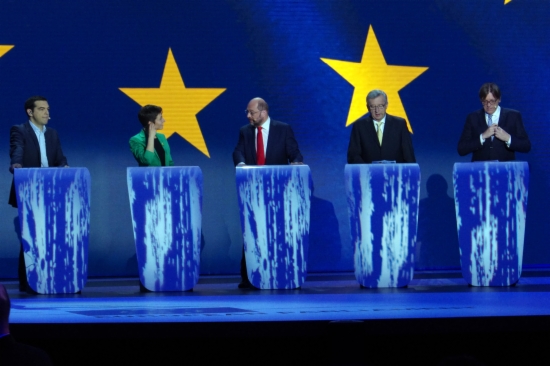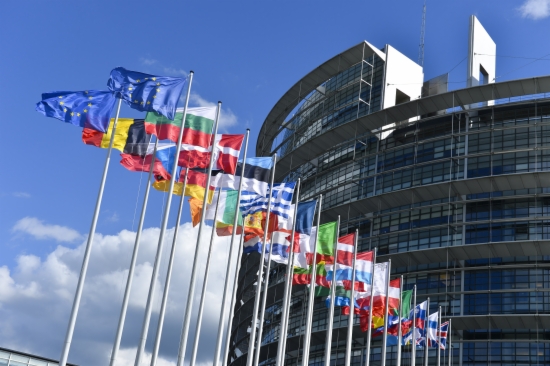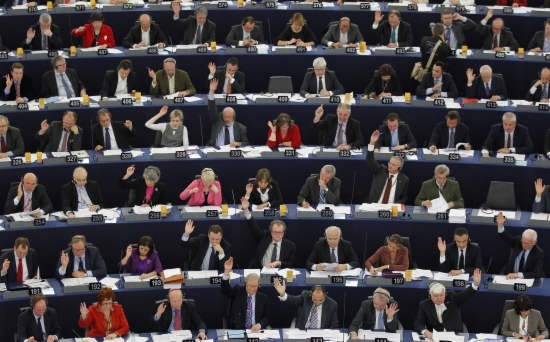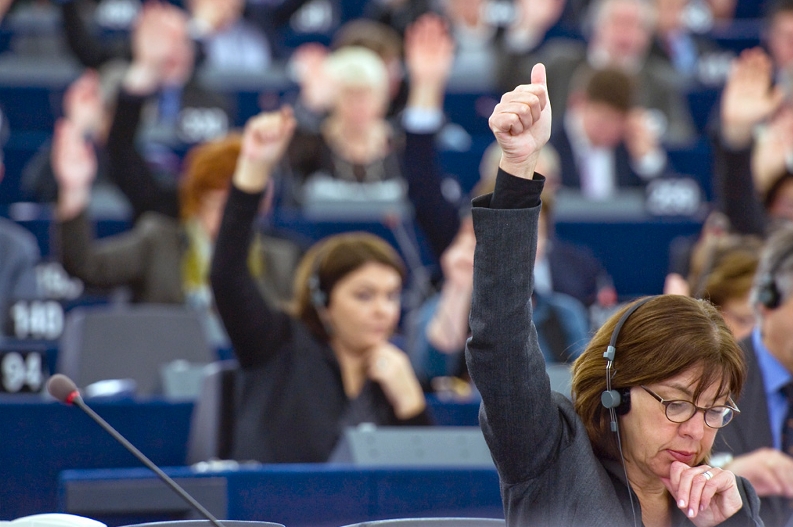21.05.2014 - 08:39
On Sunday, European citizens will be able to vote in the EU Parliament elections. These elections have distinct particularities with respect to the elections to the Catalan, Spanish, or French parliaments: each state is a single electoral district and the elected members are not divided into parties, but rather into European parliamentary groups. The result is that some lists include candidates that can end up in distinct groups, as is the case of CiU and ICV-EUiA. It can also happen that parties that are parts of different coalitions can end up in the same European parliamentary group. In the end, it can be confusing: where will my vote end up? Which presidential candidate will get the support of the party we vote for? We’ll try to answer all of those questions below.
What groups are there in the European Parliament and which parties are they composed of?
European People’s Party Group (EPP)
Formed by EU members of the European People’s Party, containing:
Partido Popular (People’s Party, which grew out of People’s Alliance Party and whose name is posterior to, and likely comes from the European People’s Party)
Unió Democràtica per Catalunya (UDC, Democratic Union of Catalonia, part of CiU coalition)
VOX
Unió per a un Moviment Popular (Union for a Popular Movement)
Progressive Alliance of Socialists and Democrats (S&D).
Formed by the Party of European Socialists. It contains:
Partit dels Socialistes de Catalunya (PSC, Socialists’ Party of Catalonia)
Partit dels Socialistes del País Valencià (PSPV, Socialist Party of the Valencian Country)
Partits dels Socialistes de les Illes Balears (PSIB-PSOE, Socialist Party of the Balearic Islands)
Socialist Party (France)
Alliance of Liberals and Democrats for Europe Group (ALDE).
Liberal-centrist group comprised of the Alliance of Liberals and Democrats for Europe Party and the European Democratic Party. It includes:
Convergència Democràtica de Catalunya (CDC, Democratic Convergence of Catalonia, part of CiU coalition)
Moviment Demòcrata (Democratic Movement)
Ciutadans (Citizens) i UPyD (Union, Progress and Democracy) have asked to join, but it seems they will not be admitted. Indeed, Guy Verhofstadt just blocked their entry a few days ago.
The Greens–European Free Alliance (Greens/EFA)
Formed by the European Green Party (EGP), which contains
Iniciativa per Catalunya (ICV, Initiative for Catalonia Greens)
And the European Free Alliance (EFA), which contains
Esquerra Republicana de Catalunya (Republican Left of Catalonia)
PSM-Nationalist Agreement (PSM-Entesa Nacionalista)
Bloc Nacionalista Valencià (Valencian Nationalist Bloc)
Unitat Catalana (Catalan Unity)
European United Left–Nordic Green Left.
Left wing, mostly socialist and communist group formed by the European Left Party, Nordic Green Left Alliance and other non-affiliated parties. It contains:
Esquerra Unida (Izquierda Unida, United Left)
Partit Comunista Francès (part of Left Front).
European Conservatives and Reformists
Conservative, anti-federalist, and Eurosceptic group, comprised of the Alliance of European Conservatives and Reformists and the European Christian Political Movement. It has no local representatives.
Europe of Freedom and Democracy
Right-wing, Eurosceptic group, formed by Movement for a Europe of Liberties and Democracy and other extreme groups. It currently has no representation in the country.
—What coalitions are running? Where will my vote go if I vote for CiU? What about for ICV-EUiA? And Esquerra pel Dret de Decidir (Left for the Right to Decide)?
After looking through the list of groups and the parties that make them up, many questions come to the fore: How are the members of each candidacy distributed if they form parts of multiple groups? If I vote for CiU, will my vote go to ALDE or to EPP? Which members of the list are from CDC and which are from UDC? If I vote for the ICV-EUiA candidacy, will I be represented by an MEP from the Greens or from the United Left? Will they vote for Ska Keller or Alexis Tsipras for president of the European Commission?
Let’s take a look. We’ll go through the principal coalitions in the Spanish State that are running in the European elections and see which candidates belong to which parties.
Coalició per Europa (Coalition for Europe): Formed by CDC, UDC, PNB (Basque Nationalist Party) and Coalició Canària (Canarian Coalition), among others.
The first candidates on the party list are, in order: Ramon Tremosa (CDC), Izaskun Bilbao (PNB), Francesc Gambús (UDC) and José Javier Morales (CC). The two first MEPs that win will go to the Alliance of Liberals and Democrats for Europe Group (ALDE). The third, Francesc Gambús, will go to the European People’s Party. Members of the Canarian Coalition have formed part of ALDE when they have had representation.
Esquerra Plural: Formed by, among others, IU (United Left), ICV, EUiA, EUPV i Anova.
The first candidates on the list are, in order: Willy Meyer (IU), Paloma López (IU), Ernest Urtasun (ICV), Marina Albiol (EUPV), Marina Lidia (Anova). The candidates from IU, EUiA i EUPV who are elected will form part of the European Left group. Ernest Urtasun from ICV would be the only MP to form part of the Greens.
L’Esquerra pel Dret de Decidir (Left for the Right to Decide): Formed by ERC, Nova Esquerra Catalana (NECat) and Catalunya Sí.
At the top of the list are: Josep-Maria Terricabras (ERC), Ernest Maragall (NECat) and Jordi Solé (ERC). ERC is a member of the European Free Aliance, so in theory, all of its elected members would form part of that group. Terricabras has not ruled out the possibiity that one of the other members of the candidacy form part of another group, like the socialists. In declarations to Catalunya Ràdio he said: ‘Ernest Maragall could ask to join the Socialist parliamentary group. That wouldn’t be a problem for us: indeed it would be great if we had our own members in three or four parliamentary groups.’ However Terricabras later added, in declarations to VilaWeb that that would only happen if the Socialist group was committed to defending the Catalan referendum.
Primavera Europea (European Spring): Formed by Compromís (Commitment Coalition), Equo, Chunta Aragonesista and others. The head of the list is Jordi Sebastià, from Compromís; he is followed by Florent Marcellesi (Equo) and Ángela Labordeta (CHA). In this case, the first and third candidates would form part of EFA, while the second would go with the Greens. At any rate, the Greens and EFA form a single group in the EU Parliament.
Which brings us to another curious situation: the ERC, ICV, Compromís, Equo MEPs would end up forming part of the same parliamentary group: Greens/EFA.
Els Pobles Decideixen (The Peoples Decide). Formed by EHBildu and BNG, among others.
All of the candidates would form part of the Greens/EFA.
—Who is the candidate for President of the European Commission for each European political party?
Last but not least, one of the novelties of this election is that the members of the new parliament will vote for the president of the European Commission, although the ultimate decision will be made by the European Council. As Laura Ruiz Trullols explained in this report, the Council will make a proposal for the presidency after taking into account the result of the elections and after negotiating with the groups in the chamber. This candidate will present his or her program to the Parliament, which will have to accept it with a supermajority. To ensure that the Council takes into account the results of the elections, the large political families decided to present candidates to the Commission, which they made visible during the campaign and debates.
These are the candidates for each European party:
European People’s Party (PP, UDC, VOX): Jean-Claude Juncker
European Socialist Party (PSOE, PSF): Martin Schulz
Alliance of Liberals and Democrats for Europe (CDC, PNB): Guy Verhofstadt
European Green Party (ICV, Compromís, Equo): Ska Keller i José Bové
Party of the European Left (IU, EUiA, EUPV, Podemos): Alexis Tsipras
European Free Alliance (ERC) has not designated a candidate.






